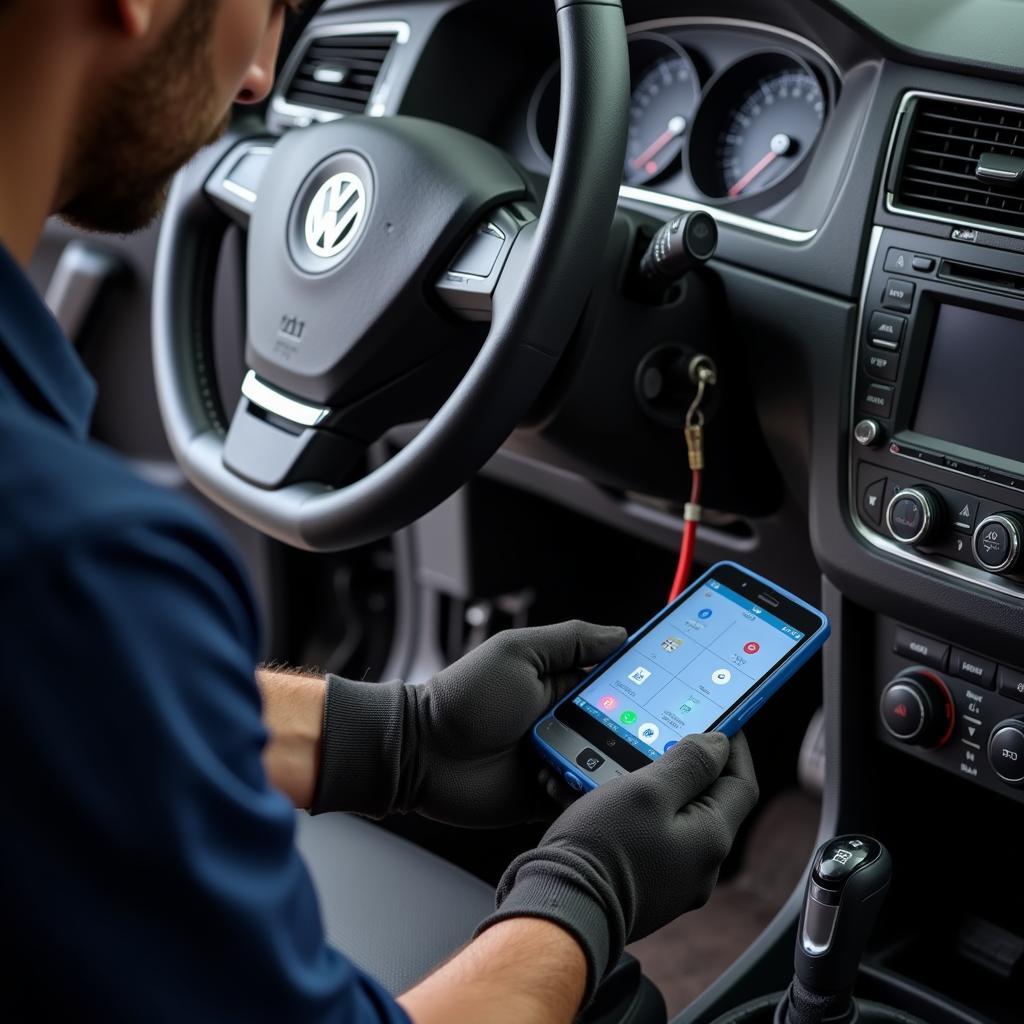Your cart is currently empty!

Engine Fault Codes VW: Understanding and Troubleshooting
Engine fault codes are a common source of frustration for Volkswagen owners. These cryptic codes can indicate a wide range of issues, from minor sensor malfunctions to serious engine problems. Understanding what these codes mean and how to address them can save you time, money, and unnecessary headaches.
Right after the check engine light pops up on your dashboard, your first instinct is probably to head straight to a mechanic. While this isn’t a bad idea, especially for serious issues, understanding VW engine fault codes can give you a head start in troubleshooting the problem. You might even be able to solve the problem yourself!
What are VW Engine Fault Codes?
Your Volkswagen is equipped with an onboard computer system known as the Engine Control Unit (ECU). This system continuously monitors various sensors and components throughout your vehicle, ensuring everything runs smoothly. When the ECU detects a problem, it logs an engine fault code, also known as a Diagnostic Trouble Code (DTC), in its memory.
These codes are essentially a mechanic’s shorthand – alphanumeric codes that correspond to specific issues within your VW’s engine or emission control systems. For instance, you might come across the p10ac vw fault code, which points to an issue with the intake manifold runner position sensor circuit.
Why Do Engine Fault Codes Appear?
A check engine light doesn’t always mean your car is about to break down. Engine fault codes can be triggered by a variety of issues, some more serious than others. Here are some common culprits:
- Sensor Problems: Sensors play a crucial role in monitoring your engine’s performance. A faulty oxygen sensor, mass airflow sensor, or crankshaft position sensor can throw off the engine’s air-fuel mixture, leading to reduced performance and increased emissions.
- Emissions System Issues: Your Volkswagen’s emissions system is responsible for reducing harmful pollutants. A faulty catalytic converter, evaporative emissions system, or oxygen sensor can trigger engine fault codes.
- Misfires: Misfires occur when a cylinder in your engine fails to ignite the air-fuel mixture properly. This can be caused by faulty spark plugs, ignition coils, or fuel injectors.
- Vacuum Leaks: Leaks in the intake manifold or vacuum hoses can disrupt the engine’s air intake, affecting performance and fuel economy.
- Loose Gas Cap: It might sound surprising, but a loose or damaged gas cap can trigger engine fault codes related to the evaporative emissions system.
How to Read VW Engine Fault Codes
While the appearance of an engine fault code might initially seem daunting, understanding these codes can empower you to address the issue head-on. Here’s how you can retrieve and decipher those codes:
- Use an OBD-II Scanner: An OBD-II scanner is a handheld device that plugs into your VW’s OBD-II port, typically located under the dashboard on the driver’s side. These scanners are readily available online or at auto parts stores.
- Retrieve the Codes: Once connected, turn on your car’s ignition (but don’t start the engine). The scanner will communicate with your car’s ECU and retrieve the stored engine fault codes.
- Decode the Codes: The scanner will usually display the codes as a combination of letters and numbers, like “P0171” or “P2187.”
 OBD-II Scanner Reading VW Fault Code
OBD-II Scanner Reading VW Fault Code
Decoding these codes is where things get a bit tricky. While some scanners offer basic code definitions, many don’t. Thankfully, several resources are available to help you decipher those cryptic codes:
- Owner’s Manual: Your Volkswagen owner’s manual may provide a list of common engine fault codes and their descriptions.
- Online Resources: Numerous websites specialize in decoding engine fault codes for various car manufacturers, including Volkswagen. You can simply input the code into the website’s search bar to find its meaning. For example, if you are experiencing issues with your Tiguan, you can research common issues like the p2187 code vw tiguan to find solutions.
- Professional Mechanics: If you’re unsure about the meaning of a particular code or how to address it, consulting a qualified mechanic is always recommended.
Common VW Engine Fault Codes and Their Meanings
Here are some commonly encountered VW engine fault codes to give you an idea of what to expect:
- P0171: System Too Lean (Bank 1): This code suggests that the engine is running lean, meaning there is too much air compared to fuel in the air-fuel mixture. This could indicate issues with the mass airflow sensor, oxygen sensor, fuel pressure regulator, or vacuum leaks.
- P0420: Catalyst System Efficiency Below Threshold (Bank 1): This code points to a problem with the catalytic converter’s efficiency. Possible causes include a faulty catalytic converter, oxygen sensor issues, or engine performance problems.
- P0300: Random/Multiple Cylinder Misfire Detected: As the code suggests, this indicates that one or more cylinders in your engine are misfiring. This could be caused by faulty spark plugs, ignition coils, fuel injectors, or a problem with the engine’s compression.
- VW code p2: This category of codes signifies issues related to the fuel and air metering system in your Volkswagen.
- VW Golf Mk4 Engine Fault Codes: This list provides a comprehensive overview of common engine fault codes specifically encountered in Volkswagen Golf Mk4 models.
Tips for Troubleshooting Engine Fault Codes
Finding the right solution often involves some detective work. Here are some general tips to help you troubleshoot engine fault codes in your Volkswagen:
- Check for Loose Connections: Start with the simplest solution. Inspect the wiring and connections around the affected components for any looseness or damage.
- Inspect Vacuum Hoses: Carefully examine all vacuum hoses for cracks, leaks, or disconnections. A simple leak can disrupt the engine’s air intake and trigger fault codes.
- Clean or Replace Air Filter: A dirty or clogged air filter can restrict airflow to the engine, potentially triggering certain fault codes. Cleaning or replacing the air filter is a quick and easy fix.
- Consider Sensor Replacement: Sensors are prone to wear and tear over time. If you suspect a faulty sensor, consider replacing it with a new one.
- Seek Professional Help: If the problem persists or you’re uncomfortable troubleshooting further, it’s best to seek help from a qualified Volkswagen mechanic.
 Mechanic Inspecting VW Engine
Mechanic Inspecting VW Engine
Best Fault Code Reader for VW
Investing in a high-quality OBD-II scanner can be a wise decision for any Volkswagen owner. Not only will it allow you to read and clear engine fault codes, but it can also provide valuable data about your car’s performance.
For Volkswagen vehicles, it’s recommended to choose a scanner that supports VW-specific protocols and offers advanced features like live data streaming, component activation, and adaptation resets. When looking for the best fault code reader for vw, consider factors like ease of use, features offered, compatibility, and of course, user reviews.
Conclusion
Understanding and addressing engine fault codes in your Volkswagen doesn’t have to be a daunting task. By familiarizing yourself with the basics, investing in a reliable OBD-II scanner, and using the available resources, you can take charge of your VW’s health and keep it running smoothly for years to come.
While this guide offers a starting point, always remember that seeking help from a qualified mechanic is recommended for persistent or complex engine problems. Contact VCDS Tool at +1 (641) 206-8880 and our email address: vcdstool@gmail.com or visit our office at 6719 W 70th Ave, Arvada, CO 80003, USA for expert assistance.
by
Tags:
Comments
One response to “Engine Fault Codes VW: Understanding and Troubleshooting”
[…] engine fault codes vw […]
Leave a Reply